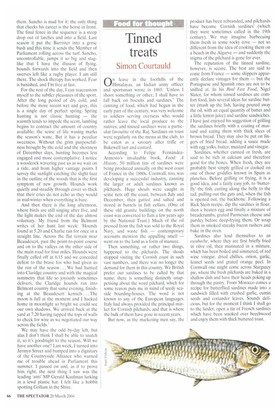Tinned treats
Simon Courtauld
r`tn leave in the foothills of the V./Himalayas, an Indian army officer and sportsman wrote in 1865: 'Unless I shoot something or other, I shall have to fall back on biscuits and sardines.' The canning of food, which had begun in the early part of the century, was very welcome to soldiers serving overseas who would rather leave the local produce to the natives; and tinned sardines were a particular favourite of the Raj. Sardines on toast were regularly on the menu at the club, to be eaten as a savoury after trifle or Bakewell tart and custard.
According to Felipe FernandezArmesto's invaluable book, Food: A History, 50 million tins of sardines were being produced annually on the west coast of France in the 1880s. Cornwall, too, was developing a successful industry, canning the larger or adult sardines known as pilchards. Huge shoals were caught in seine nets off the coast, between July and December, then gutted and salted and stored in barrels in fish cellars. (One of these old granite buildings on the north coast was converted to flats a few years ago by the National Trust.) Much of the oil pressed from the fish was sold to the Royal Navy, and waste fish — contemporary accounts mention the appalling smell — went on to the land as a form of manure.
Then something, or rather two things, happened to the pilchards. The shoals stopped visiting the Cornish coast in such vast numbers, and there was no longer the demand for them in this country. We British prefer our sardines to be called by that name; there is something distinctly unappetising about the word pilchard, which for some reason puts me in mind of seedy seaside boarding-houses. The word is not known to any of the European languages. Italy had always provided the principal market for Cornish pilchards, and that is where the bulk of them have gone in recent years.
But now, as the marketing men say, the product has been rebranded, and pilchards have become 'Cornish sardines' (which they were sometimes called in the 19th century). We may imagine barbecuing them fresh in some rocky cove — not so different from the idea of cooking them on a beach in the Algarve — and suddenly the stigma of the pilchard is gone for ever.
The reputation of the tinned sardine, however, is secure. The best are said to come from France — some shippers apparently declare vintages for them — but the Portuguese and Spanish ones are not to be sniffed at. In his Real Fast Food, Nigel Slater, for whom tinned sardines are comfort food, lists several ideas for sardine butter (mash up the fish, having poured away the oil, with an equal quantity of butter and a little lemon juice) and sardine sandwiches. I have just enjoyed his suggestion of grilling the sardines briefly with a coating of mustard and eating them with thick slices of brown bread. They may also be put on fingers of fried bread, adding a sauce made with egg yolks, butter, mustard and vinegar.
Sardines, whether canned or fresh, are said to be rich in calcium and therefore good for the bones. When fresh, they are probably best simply grilled or cooked on one of those griddles known in Spain as planchas. Before grilling or frying, it is a good idea, and a fairly easy job, to 'butterfly' the fish, cutting along the belly to the tail, pulling out the guts and, when the fish is opened out, the backbone. Following a Rick Stein recipe, dip the sardines in flour, then a beaten egg and finally a mixture of breadcrumbs. grated Parmesan cheese and parsley before deep-frying them. Or wrap them in smoked streaky bacon rashers and bake in the oven.
Sardines also lend themselves to an escabeche, where they are first briefly fried in olive oil, then marinated in a mixture, which has been boiled and simmered, of red wine vinegar, dried chillies, onion, garlic, fennel seeds and grated orange peel. In Cornwall one might come across Stargazey pie, where the fresh pilchards are baked in a shallow dish and have their heads poking up through the pastry. From Morocco comes a recipe for butterflied sardines made into a sandwich filled with crushed garlic, cumin seeds and coriander leaves. Sounds delicious, but for the moment I think I shall go to the larder, open a tin of French sardines which have been smoked over beechwood and enjoy them with thick buttered toast.


















































































 Previous page
Previous page